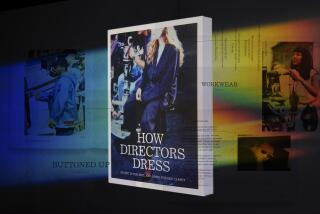It’s Integrity, Not Desperation, That Drives Ad Guys in Hollywood
Warren Berger’s article on the major studios’ seduction of TV commercial directors to do feature films (“The Ad Guys Take Charge,” Sunday Calendar, July 25) misses the point of this mating dance. The studios are holding the door wide open for hot new commercial and video directors, except in many cases it’s a trapdoor. Here’s what the trapdoor looks like and sounds like: “All you gotta do is that first picture, comply, be a good boy and after that you can do what you want.” Sure, if you win the lottery, if you get a script that’s comprehens-
ible and directable, not one that they don’t understand either but hope you can save with all your TV commercial razzle-dazzle and visual sleight-of-hand.
Studios can afford to throw a lot of paint at the wall hoping it will dry up as the “Mona Lisa.” I can’t.
The article concludes that “directors from the world of TV commercials are considered hot properties in Hollywood these days” and then gives as reasons . . . A. “low-flying salaries and mass appeal know-how” and B. “they know how to play the game.” The latter means that they won’t go into an artistic funk if someone suggests a focus-group pre-test of their work. . . . Hey, that comes with the TV commercials territory.
Often we are led by studios to believe that they came to us for our vision. Only afterward do we realize that it all is about expectations that we’re cheap and malleable, willing to fulfill their vision before our own. Sometimes it’s what you don’t do that makes you the person you are rather than doing a movie just to do a movie.
Mr. Berger’s article conveys the prevailing perception that TV commercial directors will do anything to direct a feature . . . anything. Look how cheap (salary) they come. But if I were to do that first film for the short buck, it would not be because I’m desperate. Authenticity and the big vision are what matter to me much more than the big bucks, the big picture, the big budget or the big star.
These TV ad directors are not the same breed of directors-of-the-future who come to Hollywood through the port-of-entry of Sundance or the breakout, privately financed $25,000 movie. In the TV ad game, you make more a year than anyone on the L.A. Dodgers except Kevin Brown. They can afford to hold out for their vision. The commercials people who pay me to pioneer new techniques and effects in making commercials and music videos pay me for my vision, not for my compliance. I feel blessed to be in a business that is creatively and financially so rewarding that I don’t need to jump into any movie or other situation out of necessity or the press of blind ambition.
Which brings us to the distortion of my own words and experience. Mr. Berger said of me (bear in mind that nothing of the following is correct except that the names are spelled right) “the ad director Marcus Nispel, hired last year for the upcoming Arnold Schwarzenegger movie ‘End of Days,’ (well, that’s true) was subsequently replaced (which implies “fired” even though I actually resigned in an amicable circumstance) but not before he raised some eyebrows in the film industry. Nispel told Premiere magazine that he had demanded ‘the same respect you would give a Coppola or a Kubrick,’ even though it was his first film.”
This statement attributed to me in Premiere wasn’t a misquote or a quote out of context. It was merely my echoing a quote made by director Tony Kaye about actors editing his film “American History X.” But now I will have to live with its authorship and in the most arrogant possible context.
I know it seems hard for an entertainment journalist or a studio exec to fathom that any young director would just walk away from a “once-in-a-lifetime chance,” from a $120-million film as I did, so the assumption that I was fired from “End of Days” is natural, however incorrect. It was, for several reasons, simply not the right first film for me, and I’m delighted that Arnold Schwarzenegger and the people at Beacon Films understood that and remained friends and supporters.
Your article implies concern that commercial directors might change the face of Hollywood. You should take heart rather that many actually discriminate in selecting a first film. In my book, this shows integrity rather than arrogance. And, finally, please remember that they called us . . . we didn’t call them. They come to us for the images that flood commercials and music videos. After a decade that can hardly be called the Golden Age, movies concocted by suits and their formulas leave audiences seemingly so starved for great images that they take them in any shape they can. Sadly enough, even a two-hour commercial or music video seems to suffice. Is this the good news or the bad news? You decide. Micromanaging scripts is not producing satisfying films, so at least the executives want someone who can make them loud and colorful and big.
But if they would only pair these “ad guys” and their apparent “vision” with a decent script, they’d have a movie.
More to Read
The biggest entertainment stories
Get our big stories about Hollywood, film, television, music, arts, culture and more right in your inbox as soon as they publish.
You may occasionally receive promotional content from the Los Angeles Times.










